树形form of fruit tree
果树树冠结构外形的总称。果树的树形有两种含义: 从植物学特征的角度说, 是指在自然生长状态下树冠的外形, 又称树姿;经人工整形的树形是指由树冠骨架构成的外形。树形的形成取决于生物学特性, 如分枝角度、极性、生长势、成枝力、萌芽力、枝条的软硬等。同时应考虑栽培目的, 整形方法及砧木等(见果树整形、修剪)。
果树资源调查研究时,对自然状态下树形的记载,主要依树冠所呈的几何图形。凡分枝角度小,极性强,生长势强的树种、品种, 多具有较为直立的树形, 如长圆形、圆柱形、狭圆锥形、倒圆锥形、纺锤形等; 分枝角度大, 极性弱, 枝条较软的树种、品种, 则大多具有开张的树形, 如扁圆形、半圆形、宽圆锥形; 干性弱、枝条软、分枝角度大, 枝条多下垂或横生, 则树形紊乱成为披散形; 从地面萌生多个树干则树冠常成丛状形。自然状态下的树形, 在反映其生物学特性方面具有一定的代表性。
果树生产上所说的树形, 则由一定的骨干枝和枝组构成骨架的树冠。丰产树形要具有以下特征:低干、矮冠、主枝少、侧枝小、角度开张, 枝组多而配置合理(图1)。
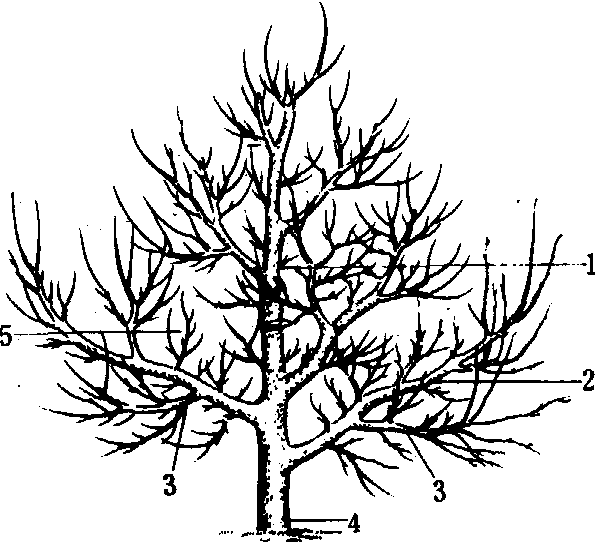
图 1 树冠结构示意图(疏散分层形)
1. 中心干; 2. 主枝; 3. 侧枝; 4. 树干; 5. 枝组
根据果树的生物学特性,环境条件和栽培目的,果树人工自然形分为有中心干形、无中心干形和匍匐形三类。有中心干的树形, 主要有疏散分层形、二层开心形、十字形、圆锥形、变形主干形、圆柱形、纺锤形、中干小冠形等。无中心干的树形, 主要有杯状形、自然开心形、盘状形、三挺身形、多主枝圆头形、丛状形等。树冠扁平需要支架的有扁纺锤形、棕榈叶形、“V”字形、水平棚架形、篱壁形(见架式)。匍匐形为寒地果树以适应埋土之需的特殊树形( 见匍匐栽培)。树形的主要类型分述如下:
疏散分层形 又称主干疏层形。是由圆锥形树冠演化而成, 是苹果、梨等干性强的果树常用树形。在核桃、板栗、柿、山楂等果树上也有应用。树冠呈半圆形或扁短圆锥形(图2)。有强健的中心干, 主枝5~6个,分三层着生于中心干上, 第一层分枝3个, 第二层主枝1~2个,第三层主枝1个。干高50~60厘米,第一、二层主枝间的层距为80~100厘米, 山地为60~80厘米。第一层3主枝平面夹角为120°左右; 开张角度60°左右。每主枝两侧配2~3个侧枝错落着生。第二、三层主枝开张角度50°左右, 与第一层主枝错开方位, 各配2个侧枝。主干疏层形, 成形快,结果早,丰产。幼树生长健旺时, 第三层以上可留中心枝, 进入结果期树冠渐相接时, 可疏去,并可逐步落头开心,以防止后期内膛空虚, 结果部位外移。如系短枝型苹果品种,由于分枝少,树形矮化, 主枝或侧枝实际上相当于大的结果枝组, 因此可增加1~2个, 以增加枝组数量扩大结果面积。
如主枝不分层次, 任其自然选留, 树形较高, 则成为圆锥形或变则主干形。前者目前多应用于枣、柿、银杏、核桃、香榧和橄榄等树种, 后者在苹果和洋梨上部分采用。
322
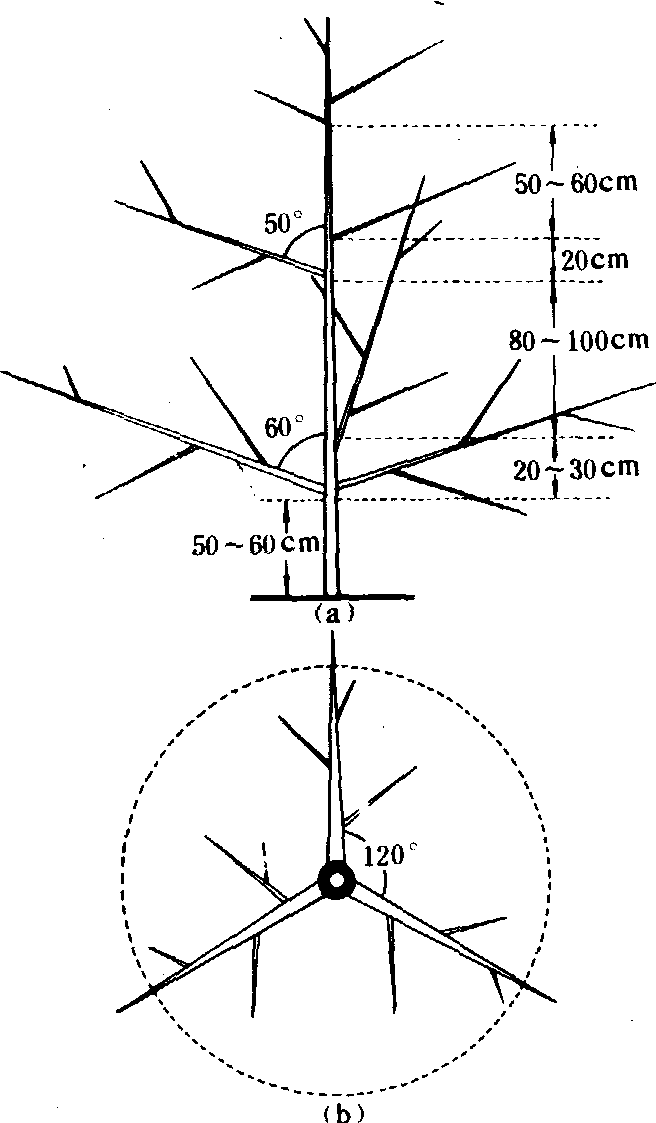
图 2 主干疏层形结构示意图
(a) 侧视; (b) 俯视第一层
自然开心形 简称“开心形”。它是在杯状形的基础上改进而来的。兼有杯状形光照条件好、树体矮小易管理,又避免了杯状形机械整形, 修剪量大的特点。标准树形为: 干高30~50厘米, 干上端错落着生2~4个(多数为3个)主枝, 分别向四周斜伸、每主枝的背斜方向分生3~4个侧枝,开张角度为70°~80°, 侧枝上着生枝组。主枝角度可以不同, 第1主枝角度可加大至60°~70°, 第2、3主枝角度减小至40°~60°, 使主枝叶幕相互错落, 可以充分利用空间。主枝背上可选留一中小枝组斜向冠内,以防止骨干枝发生日灼。树高一般控制在3米以内。开心形整形容易,成形快,结果早, 光照好, 果实品质优良。树体矮小, 树势易衰弱, 应注意后期扶持, 适于喜光、干性弱的桃、梅、李等(图3)。
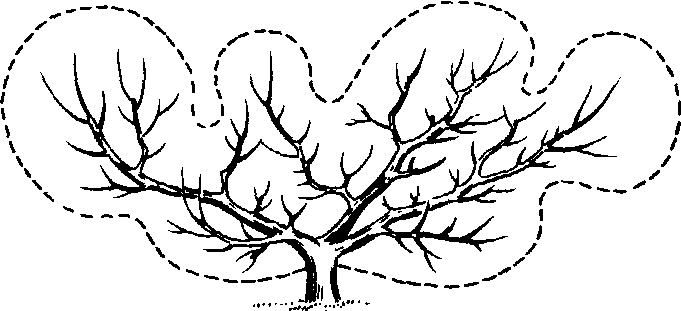
图 3 自然开心形
二层开心形 是疏散分层形、开心形之间的一种树形, 其成形有三种方式: 一是在开张角度较大的开心形或盘状形的基础上, 选一主枝的背上枝, 培养成中心干, 并分生第二层主枝; 二是在主干疏层形的基础上, 疏除二层以上的中心干及第3层主枝; 三是从幼树起,即按二层开心形培养。二层开心形,干高50~60厘米, 5个主枝, 第一层3个, 开张角度60°~70°,每主枝2~3个侧枝; 第二层2个,开张角度50°~60°,与第一层间距1米左右, 并错开方位, 各留1~2个侧枝, 适于极性强及喜光树种的一些品种。苹果和桃树也可应用(图4)。
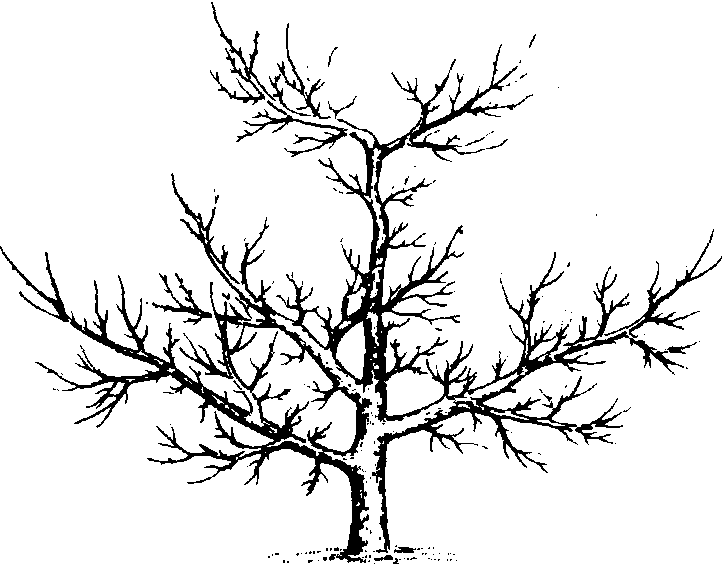
图 4 二层开心形
三挺身形 是山东省青岛市梨树栽培区在梨树多主枝自然圆头形基础上, 锯除树冠中间中心干后, 改造而来的树形, 三挺身形以3个主枝斜向上长构成树冠第一级骨架。树干高40~50厘米, 树高4~5米, 树冠呈圆筒形。3主枝从树干上以30°角斜向上生长, 中空。每主枝向外分生2~3个大枝组,第一枝组呈80°~90°开张角度, 近于水平, 第二、三枝组角度分别为60°~80°, 50°~70°, 枝组间距离1.3~1.5米。下层每个大枝组再分生2~3个侧枝组,上二层枝组分生1~2侧生枝组, 全树共15~20个侧枝组(图5)。由于三个大主枝并行向上生长,树的上强优势得以缓和, 但又能长期维持树势、骨架牢, 透光好, 适于中国梨品种,在苹果、桃树上也有试用。山东栖霞、莱阳在盘状形上向上留3个斜向生长主枝, 构成盘状挺身形, 扩大了结果面积, 增加了产量。
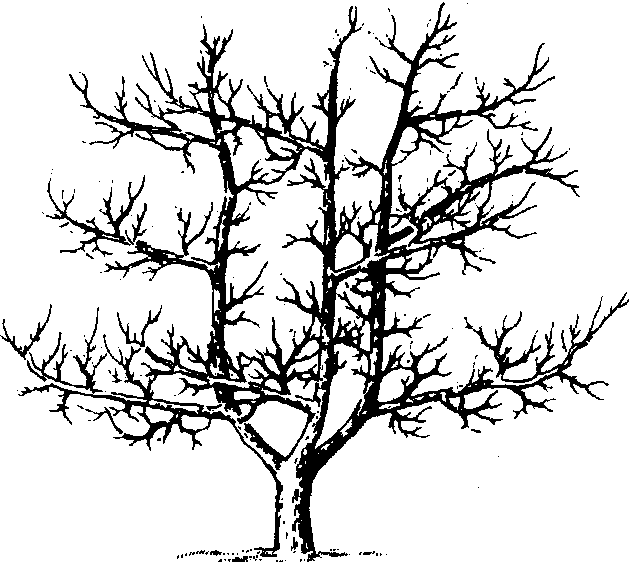
图 5 三挺身形
自然圆头形 又称自然半圆形(图6)。定干后,在干上端任其自然生长的基础上, 选留四向开张的几个大枝作骨架, 疏除过密的枝条而成。主枝的方向、角度均无一定格局, 没有明显的层次, 树冠外形为半圆形。侧枝、枝组插空分布, 造形自然、容易, 结果早。但喜光果树, 树冠内部容易早空, 结果部位往往集中在树冠外围。中国在引进推广西方整形技术前, 大部分果树, 如花红、梨、柿、山楂、板栗、核桃、枣、杏及柑橘、龙眼、荔枝等多用此形, 目前许多落叶果树的老龄树、半栽培树, 以及常绿果树中的荔枝、龙眼、柑橘等耐阴果树仍然沿用。
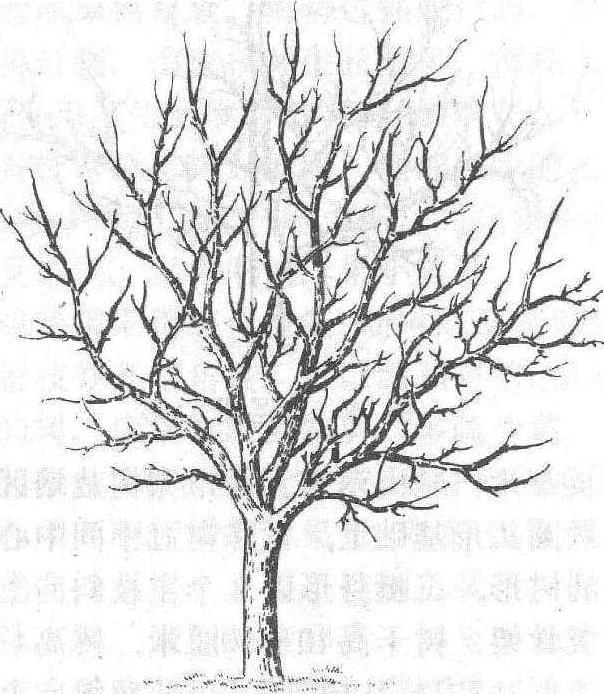
图6 自然圆头形
中干小冠形 树冠外型近似主干疏层形, 但干矮冠小, 第一层也留3个主枝, 不配备侧枝, 主枝近水平, 其上插空选留2~3个大枝, 直接分生枝组, 一般冠径2~3米,下大、上小; 树高2.5~3米,由于树冠小,骨干枝少, 树冠内膛光照条件良好, 适于密植(图7)。
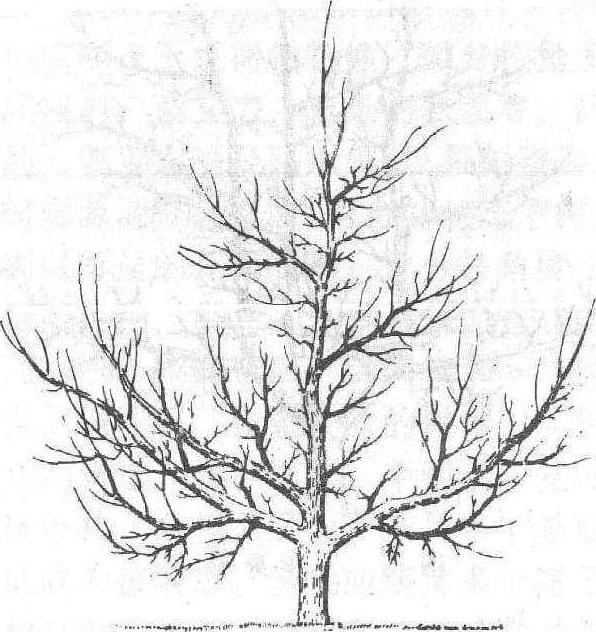
图 7 中干小冠形
丛状形 丛状形是多个主干从地面斜上生长的树形, 无明显主枝,在主干上直接着生辅养枝、枝组。丛状形可由一株分枝而来, 或栽时3~4株栽于一穴。在北方桃、中国樱桃、石榴、树莓、醋栗等果树上应用较多, 适于灌木和矮生果树, 对不良环境条件的适应性较强(图8)。
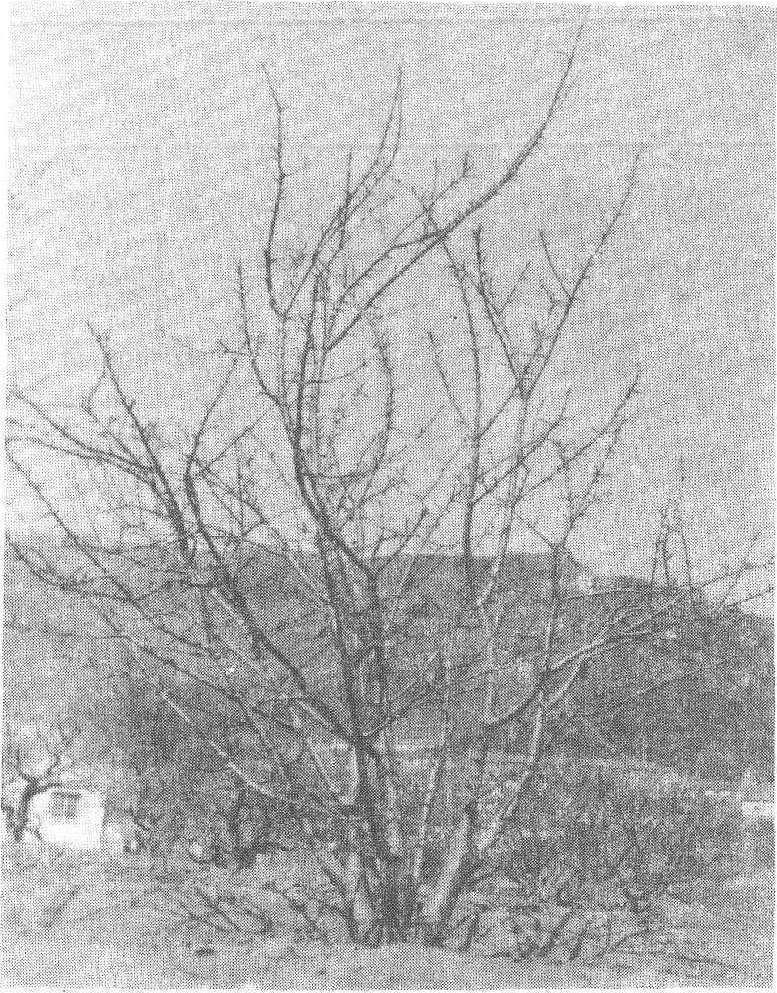
图 8 丛状形
圆柱形 源于英国, 是一种改良的主干形, 不需要支柱, 也没有主枝, 在中心干上直接着生枝组。干高40~60厘米, 树高2.5~3米, 树冠圆筒形, 冠径一般在2米以内。枝组由中心干向四周伸展,枝组间距30厘米左右,全树约30~35个枝组。每枝组配不同年龄枝条, 使新梢、果枝、结果枝三者轮换更新(图9)。圆柱形整形简单, 树冠受光条件好, 当株间相连时, 也可发展成为树篱状。

图 9 圆柱形
纺锤形 源于德国, 由主干形发展而来, 在德国、荷兰等北欧国家应用较多, 介于主干疏层形和圆柱形之间, 也是一种中干小冠形。其特点是有中心干而较矮, 第一层主枝及以上主枝不严格分层, 并由主枝直接分生枝组结果。主枝的角度较大, 伸展幅度较小, 且下大上小。纺锤形一般干高30~35厘米, 树高2.5~3米,冠径3米以内,修剪量小, 符合果树的自然生长习性, 结果早,适于梨、李、矮化、半矮化砧或短枝型苹果。对固地性差的砧木或枝条软的树种、品种,需要立支柱(见果树整形)。
篱壁形 源于法国,是依托墙壁的一种整枝形式。无主心干, 也无明显主枝和层次。树冠扁但有一定厚度(见果树整形)。干高30~40厘米, 干上所发枝条,顺行向拉成90°左右平,再由此按需要选留一些直立成斜状主枝, 树高2.8~3米, 树篱壁厚1.5~2米。这种树形也可以不立支架, 整形也可无一定模式, 比几何形篱壁形容易, 结果早, 管理方便, 成本低, 但多年后, 树墙内枝叶容易郁闭。适于长枝少、短枝多、枝叶密度小的树种、品种, 如日本梨的一些品种, 或短枝型苹果。进入结果以后要注意疏间枝条。
棕榈叶形 源于法国, 是一种人工性强的特殊整形方式。其基本结构是一个垂直的中心干, 或几个中心干, 从中心干上向左向右选留主枝, 这些枝都在一个平面上。这种树形与果树自然向四面八方生长的习性不同, 所以都用铁丝架引缚( 图10)。根据中心干和主枝结构, 又分水平棕榈叶形, 倾斜棕榈叶形和V字棕榈叶形等多种树形。树冠薄, 光照条件良好, 可提供优质果品,但树冠体积小, 产量低,欧洲南部以及气温低,生长期较短的加拿大、苏联应用于苹果、梨、桃、甜樱桃、李等果树。干高30~40厘米, 树高1.8~2.4米,3~4道铁丝, 铁丝间距30~60厘米, 6~8个主枝分为3~4层。
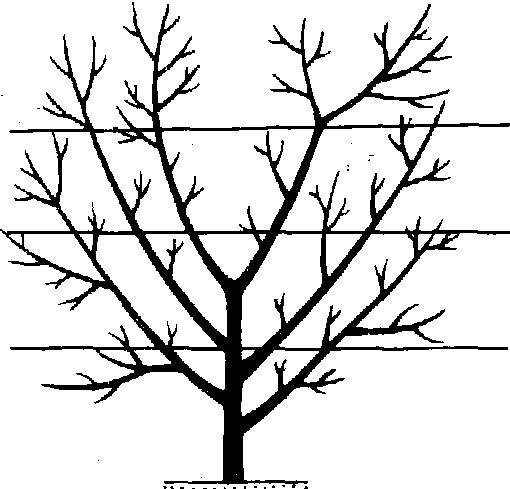
图 10 棕榈叶形
自然扇形 是与棕榈叶形相似的树形, 但不立支架, 枝叶分布有一定厚度, 是一种很扁的树形。干高30米, 主枝3~4层, 每层2个与行向保持15°夹角伸展; 第二层主枝在第一层主枝的另一侧面, 也与行向呈15°夹角, 上下两层主枝左右错开, 层间距50~100厘米。主枝上留枝组, 不留侧枝, 全树高2~3米, 株间相连时, 形成树篱状(图11)。
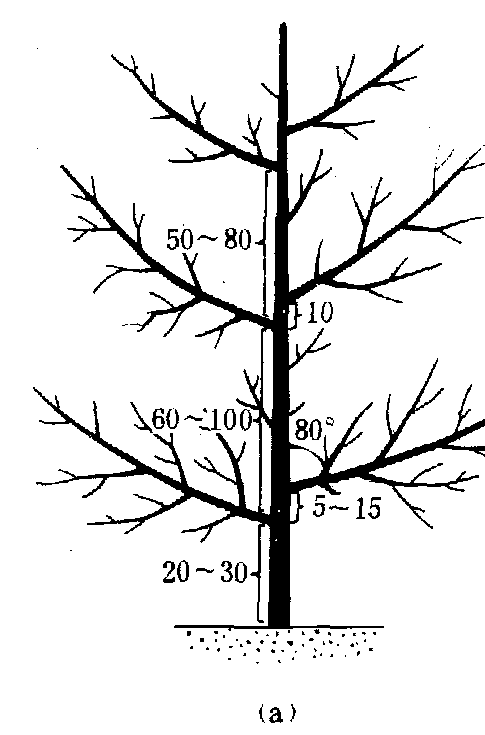
(a) 侧视;
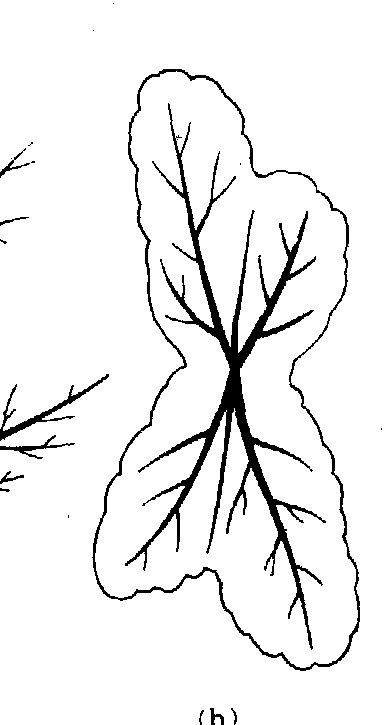
(b) 俯视
图 11 自然扇形
>V字形 果树主枝呈V字生长的一种树形。有支架者称V字架。起源于澳大利亚, 已在桃、苹果、梨等多种果树上应用, 美国、新西兰也开始应用。树干上发出2个主枝, 不留中心干, 两主枝夹角60°,并分别与地面呈60°夹角斜上生长, 架顶枝条间距2米,树高2.5~3米, 冠幅2.5米左右(图12)。V字形结果早、产量高、品质优良, 便于人工、机械疏果、采收。
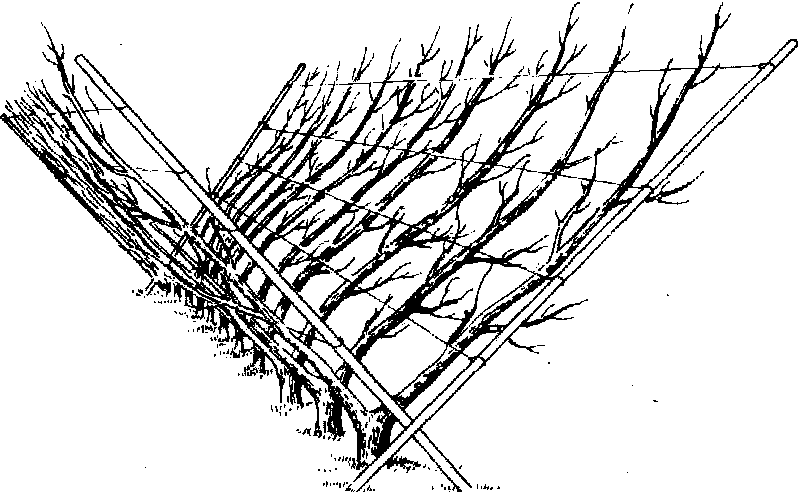
图 12 V型
树形tree form
整个树体或树冠的自然外形。在果树栽培中,多表示树体结构特点的整形树形。大体分为自然形和人工形两类。前者根据果树的生长特性模拟其自然树形,再依生产上的需求适当用人工加以调控形成,又称人工自然形,如疏散分层形、自然开心形等;后者主要根据果树生产上的需求,有时部分地违背果树的生长特性,完全用人工强制成形,如寒地果树的匍匐形、矮化果树和葡萄的篱壁形等。